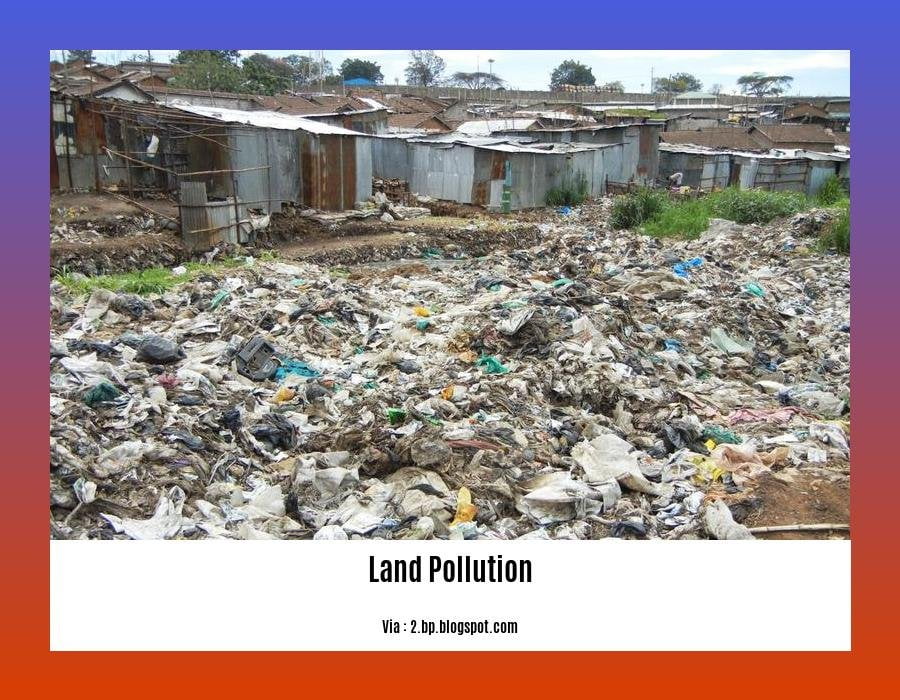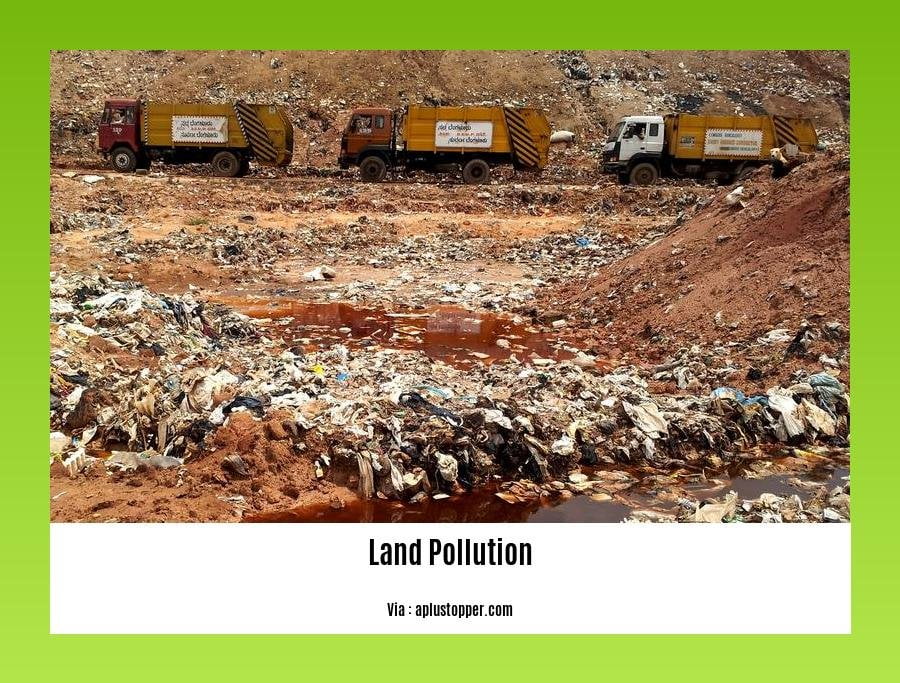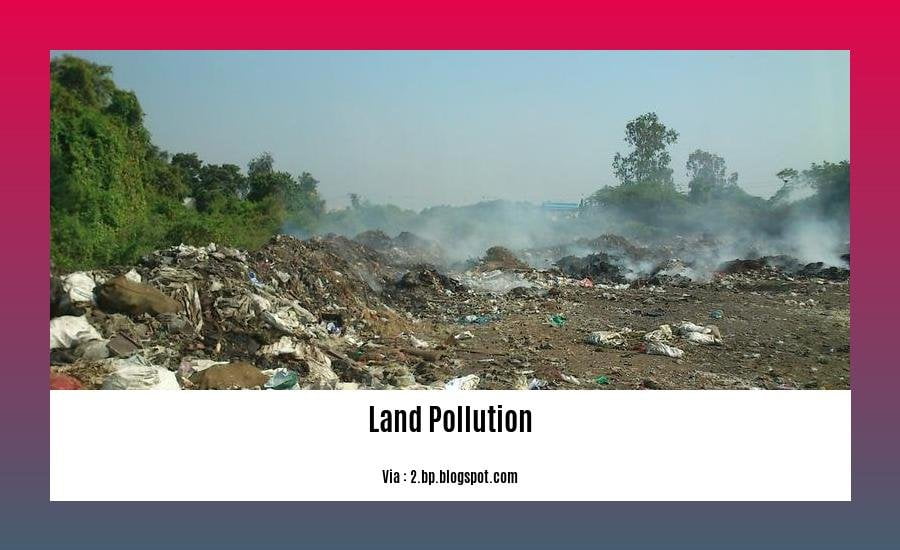In Zimbabwe, the detrimental consequences of land pollution have reached a critical point, unveiling an alarming environmental crisis. This article delves into the causes and effects of land pollution in Zimbabwe, highlighting the urgent need for measures and mitigation strategies. As the repercussions of this issue continue to escalate, it is essential to understand the extent of the problem and explore sustainable practices that can help combat this environmental disaster.
Key Takeaways:
- Poor waste management practices, including lack of waste collection and improper law enforcement, contribute to land pollution in Zimbabwe.
- Ignorance and lack of awareness about proper waste disposal among the general public exacerbate the problem.
- Insufficient infrastructure, including a lack of bins, hinders effective waste management in the Central Business District.
- Rapid urbanization leads to increased waste generation, while limited space hampers the establishment of waste management facilities.
- Implementing solutions requires proper waste management practices, increased awareness and education campaigns, and the introduction of recycling programs.
- Challenges in implementing solutions include inadequate enforcement of waste management policies, lack of funds and resources for infrastructure, and limited public participation and cooperation.
Effects of Land Pollution in Zimbabwe

Poor Waste Management
One of the major consequences of land pollution in Zimbabwe is the result of poor waste management practices. The city council fails to handle waste effectively, leading to a buildup of domestic waste that is rarely collected or not at all. Additionally, there is a lack of enforcement of policies pertaining to waste management and dumping by the local government. These factors contribute to the degradation of the land and the accumulation of pollutants, posing a significant threat to the environment and public health.
Ignorance by the General Public
Another detrimental effect of land pollution in Zimbabwe is the ignorance and lack of knowledge among the general public regarding proper waste management. Many people are not aware of the consequences of improper waste disposal and lack the know-how to handle waste appropriately. This lack of awareness and education perpetuates the cycle of pollution, as people continue to dispose of waste in harmful ways, exacerbating the environmental crisis.
Lack of Bins
The scarcity of bins, particularly in the Central Business District (CBD), further intensifies the problem of land pollution in Zimbabwe. Without sufficient infrastructure for waste disposal, people resort to improper methods of waste disposal, such as throwing trash on the streets or in open spaces. The absence of bins contributes to the accumulation of waste, leading to the contamination of the land and water sources.
Urbanization
Rapid urbanization in Zimbabwe has also played a significant role in escalating land pollution. As urban areas expand, there is a corresponding increase in waste generation. However, limited space for waste management facilities poses a challenge in effectively tackling the mounting waste issue. The lack of appropriate infrastructure hinders the proper disposal, treatment, and recycling of waste materials, intensifying the pollution of land and surrounding ecosystems.
Solutions
To address the dire effects of land pollution in Zimbabwe, it is crucial to implement sustainable waste management practices and policies. This includes the enforcement of laws and regulations related to waste management, ensuring that the city council takes responsibility for handling waste effectively. Additionally, raising awareness among the general public about the importance of proper waste disposal and providing education campaigns can empower individuals to adopt sustainable practices.
The introduction of recycling programs can further contribute to mitigating the impact of land pollution. By promoting recycling and resource recovery, valuable materials can be reclaimed, reducing the need for disposal and minimizing the accumulation of waste in landfills or open areas.
Improving infrastructure for waste disposal is also essential. By investing in waste management facilities and creating adequate space for waste treatment and disposal, Zimbabwe can effectively address the growing waste crisis.
Problems in Implementing Solutions
Despite these solutions, there are various challenges in implementing them. Inadequate enforcement of waste management policies often hampers the progress towards a cleaner environment. Without strict monitoring and penalties for non-compliance, individuals and organizations may continue to disregard proper waste management practices.
A lack of funds and resources for waste management infrastructure also poses a significant obstacle. The financial constraints faced by the government limit their ability to invest in the necessary facilities and equipment required for effective waste management.
Furthermore, limited public participation and cooperation hinder the success of waste management initiatives. Encouraging individuals to actively participate in waste reduction and recycling programs is essential for long-term sustainability. However, without the active involvement and support of the public, it becomes challenging to achieve significant progress in addressing land pollution.
In conclusion, the effects of land pollution in Zimbabwe are alarming and require immediate attention. The poor waste management practices, ignorance among the general public, lack of bins, and rapid urbanization all contribute to the degradation of the environment and public health. By implementing proper waste management practices, increasing awareness, and investing in infrastructure, Zimbabwe can work towards mitigating the dire consequences of land pollution and fostering a sustainable future.
To discover the everyday life uses of solar energy, click here.
If you’re curious about real-world examples of wind energy in everyday life, check out this article here.
Causes Of Land Pollution In Zimbabwe

Land pollution in Zimbabwe is a grave environmental crisis that has detrimental effects on the ecosystem and human health. It is crucial to understand the causes of this issue in order to tackle it effectively. In this article, we will delve into the key factors contributing to land pollution in Zimbabwe and explore potential solutions.
Poor Waste Management
One of the leading causes of land pollution in Zimbabwe is poor waste management. The city council often fails to handle waste effectively, resulting in the accumulation of waste in public spaces and natural habitats. Domestic waste and bins are rarely collected or not at all, exacerbating the problem. Additionally, inefficient law enforcement policies pertaining to waste management and dumping are not adequately enforced by the local government. This lack of regulation allows for irresponsible disposal of waste, further contributing to land pollution.
Lack of Bins
A major issue that exacerbates land pollution in Zimbabwe is the lack of bins, particularly in the Central Business District (CBD). Insufficient infrastructure for waste disposal, such as an inadequate number of bins, makes it challenging for individuals to dispose of their waste properly. This leads to littering and improper waste disposal, ultimately contributing to the contamination and degradation of land.
Urbanization
Rapid urbanization in Zimbabwe is another significant cause of land pollution. As cities expand, the generation of waste increases proportionally. Limited space for waste management facilities in urban areas further compounds the problem. The infrastructure for waste disposal struggles to keep up with the growing demands, resulting in inadequate waste management practices and a higher risk of land pollution.
Ignorance and Lack of Awareness
A lack of awareness and ignorance among the general public regarding proper waste management practices also contribute to land pollution. Many people are unaware of the consequences of improper waste disposal and lack the knowledge and understanding of how to manage waste effectively. This leads to careless waste handling, ultimately leading to land pollution.
To combat land pollution in Zimbabwe, it is crucial to implement effective solutions. Proper waste management and disposal systems should be established, with strong enforcement of policies and regulations by the local government. Public awareness and education campaigns should be conducted to promote proper waste management practices and educate individuals about the impact of their actions. Additionally, increasing the number of bins and waste collection points in the CBD can help mitigate land pollution by providing individuals with convenient and accessible waste disposal options.
In conclusion, land pollution in Zimbabwe is caused by poor waste management, a lack of bins, rapid urbanization, and a lack of awareness among the public. By addressing these causes and implementing appropriate solutions, we can mitigate the environmental crisis and pave the way for a sustainable future in Zimbabwe.
Key Takeaways:
- Poor waste management, including the failure to handle waste effectively and inefficient law enforcement, contributes to land pollution in Zimbabwe.
- The lack of bins, particularly in urban areas like the CBD, hinders proper waste disposal and leads to littering and contamination of land.
- Rapid urbanization in Zimbabwe results in increased waste generation, while limited space for waste management facilities exacerbates the problem.
- Ignorance and a lack of awareness among the public about proper waste management practices contribute to land pollution.
- Solutions to combat land pollution in Zimbabwe include implementing proper waste management systems and policies, increasing public awareness, and improving waste disposal infrastructure.
- By addressing the causes of land pollution and implementing effective solutions, we can mitigate the environmental crisis in Zimbabwe.
Sources:
1. The Geo Room – Causes & Effects of Land Pollution In Zimbabwe; Solutions & Problems
2. Environment Go! – 10 Causes of Land Pollution in Zimbabwe
Effects of Land Pollution
Land pollution in Zimbabwe has unleashed a devastating environmental crisis, leaving far-reaching consequences on our ecosystem, wildlife, and human health. As we delve into the dire effects of land pollution, it becomes apparent how urgent it is to address this pressing issue.
Soil Degradation: A Threat to Agricultural Productivity
The effects of land pollution can be observed through soil degradation, which poses a severe threat to agricultural productivity. Due to irresponsible waste disposal and the use of harmful chemicals, the fertility and composition of the soil are compromised. This results in reduced crop yield, hampering food security for the nation.
Loss of Biodiversity: Diminishing Wildlife Habitat
Land pollution contributes to the loss of biodiversity in Zimbabwe, leading to the diminished habitats of various wildlife species. Deforestation, a significant factor in land pollution, robs countless animals of their homes. Additionally, the contamination of land and water sources with toxic substances disrupts the delicate balance of ecosystems, endangering countless species.
Water Pollution: Jeopardizing Aquatic Ecosystems
Land pollution has dire effects on water bodies, endangering the fragile aquatic ecosystems that support diverse marine life. Improper waste disposal and toxic chemicals from mining operations contaminate rivers, streams, and groundwater sources, compromising water quality. This pollution not only harms aquatic species but also poses risks to human health, as communities depend on these water sources for drinking, irrigation, and fishing.
Human Health Impacts: The Silent Pandemic
Land pollution doesn’t just harm the environment—it also poses grave threats to human health. Toxic substances leached into the soil and water can find their way into the food chain, accumulating in the bodies of humans. This can lead to a myriad of health issues, including birth defects, respiratory disorders, skin diseases, and even cancer. The effects are indiscriminate, affecting individuals in both rural and urban areas.
Key Takeaways:
- Land pollution in Zimbabwe has dire effects on soil degradation, leading to reduced agricultural productivity and food security.
- Loss of biodiversity is a concerning consequence of land pollution, endangering wildlife habitats and disrupting ecosystems.
- Water pollution is a significant result of land pollution, jeopardizing aquatic ecosystems and posing risks to human health.
- Land pollution contributes to a silent pandemic, affecting human health through toxic substances present in the soil and water.
- Urgent action is needed to combat land pollution and mitigate its devastating effects on the environment, wildlife, and human well-being.
Sources:
– Journal of Environmental Management in Zimbabwe: Link
– The Conservation Institute – Land Pollution: Causes, Effects, And Solutions For The Future: Link
FAQ
Q1: What are the main causes of land pollution in Zimbabwe?
A1: The main causes of land pollution in Zimbabwe include poor waste management, ignorance by the general public about proper waste disposal, lack of bins, rapid urbanization, and limited space for waste management facilities.
Q2: What are the effects of land pollution in Zimbabwe?
A2: The effects of land pollution in Zimbabwe include deforestation, loss of habitat for wildlife, soil erosion, reduced water quality, respiratory problems, skin diseases, and contaminated water sources.
Q3: What are the solutions to address land pollution in Zimbabwe?
A3: The solutions to address land pollution in Zimbabwe include implementing proper waste management practices, enforcing environmental laws, increasing public awareness about the importance of the environment, introducing recycling programs, improving waste disposal infrastructure, and promoting sustainable practices.
Q4: What are the problems faced in implementing solutions to land pollution in Zimbabwe?
A4: The problems faced in implementing solutions to land pollution in Zimbabwe include inadequate enforcement of waste management policies, lack of funds and resources for waste management infrastructure, limited public participation and cooperation, and insufficient bins and waste collection points in the central business district.
Q5: How does land pollution in Zimbabwe affect human health?
A5: Land pollution in Zimbabwe can negatively affect human health by causing birth defects, breathing disorders, skin diseases, and an increased risk of cancer due to exposure to pollutants in the soil, water, and air.
- Crypto Quotes’ Red Flags: Avoid Costly Mistakes - June 30, 2025
- Unlock Inspirational Crypto Quotes: Future Predictions - June 30, 2025
- Famous Bitcoin Quotes: A Deep Dive into Crypto’s History - June 30, 2025



![Unveiling the Distressing Position of [City with Highest Crime Rate in Canada]: Analyzing the Factors and Exploring Solutions City-with-highest-crime-rate-in-Canada_2](https://www.lolaapp.com/wp-content/uploads/2023/12/City-with-highest-crime-rate-in-Canada_2-150x150.jpg)












